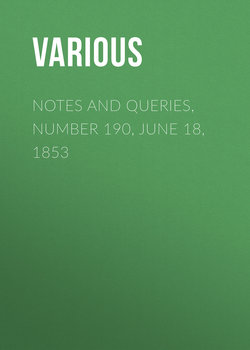Читать книгу Notes and Queries, Number 190, June 18, 1853 - Various - Страница 5
Notes
SHAKSPEARE READINGS, NO. VIII
ОглавлениеI have to announce the detection of an important misprint, which completely restores sense, point, and antithesis to a sorely tormented passage in King Lear; and which proves at the same time that the corrector of Mr. Collier's folio, in this instance at least, is undeniably in error. Here, as elsewhere (whether by anticipation or imitation I shall not take upon me to decide), he has fallen into just the same mistake as the rest of the commentators: indeed it is startling to observe how regularly he suspects every passage that they have suspected, and how invariably he treats them in the same spirit of emendation (some places of course excepted, where his courage soars far beyond theirs; such as the memorable "curds and cream," "on a table of green frieze," &c.).
I say that the error of "the old corrector," in this instance, is undeniable, because the misprint I am about to expose, like the egg-problem of Columbus, when once shown, demonstrates itself: so that any attempt to support it by argument would be absurd, because superfluous.
There are two verbs, one in every-day use, the other obsolete, which, although of nearly opposite significations, and of very dissimilar sound, nevertheless differ only in the mutual exchange of place in two letters: these verbs are secure and recuse; the first implying assurance, the second want of assurance, or refusal. Hence any sentence would receive an opposite meaning from one of these verbs to what it would from the other.
Let us now refer to the opening scene of the Fourth Act of King Lear, where the old man offers his services to Gloster, who has been deprived of his eyes:
"Old Man. You cannot see your way.
Gloster. I have no way, and therefore want no eyes;
I stumbled when I saw: full oft 'tis seen
Our means secure us, and our mere defects
Prove our commodities."
Here one would suppose that the obvious opposition between means and defects would have preserved these words from being tampered with; and that, on the other hand, the absence of opposition between secure and commodious would have directed attention to the real error. But, no: all the worretting has been about means; and this unfortunate word has been twisted in all manner of ways, until finally "the old corrector" informs us that "the printer read wants 'means,' and hence the blunder!"
Now, mark the perfect antithesis the passage receives from the change of secure into recuse:
"Full oft 'tis seen
Our means recuse us, and our mere defects
Prove our commodities."
I trust I may be left in the quiet possession of whatever merit is due to this restoration. Some other of my humble auxilia have, before now, been coolly appropriated, with the most innocent air possible, without the slightest acknowledgment. One instance is afforded in Mr. Keightley's communication to "N. & Q.," Vol. vii., p. 136., where that gentleman not only repeats the explanation I had previously given of the same passage, but even does me the honour of requoting the same line of Shakspeare with which I had supported it.
I did not think it worth noticing at the time, nor should I now, were it not that Mr. Keightley's confidence in the negligence or want of recollection in your readers seems not have been wholly misplaced, if we may judge from Mr. Arrowsmith's admiring foot-note in last Number of "N. & Q.," p. 568.
A. E. B.
Leeds.
